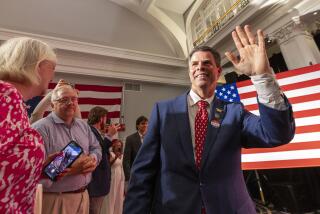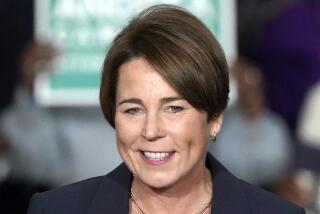2 Political Outsiders Win in Massachusetts Primary
- Share via
BOSTON — In a powerful rejection of the state’s political Establishment, Massachusetts voters Tuesday chose two outsiders, Democrat John R. Silber, and Republican William F. Weld to run for governor in November.
With 75% of the precincts counted, Silber, president of Boston University, had 53% of the vote, against 44% for former state Atty. Gen. Francis X. Bellotti. Lt. Gov. Evelyn Murphy, who withdrew from the race earlier, scored 3% of the vote.
In the Republican race, with 73% of precincts counted, Weld, a former U.S. attorney, claimed 60% of the votes to state legislator Steven Pierce’s 40%.
“What you are really seeing tonight is the expression of anger of the people of the state of Massachusetts, said Avi Nelson, a conservative political analyst and former radio talk show host. “Everybody who was associated with the Establishment has gotten clobbered.”
In a jubilant acceptance speech, Weld, 43, said: “We’re rolling now! Massachusetts voters are sick of the politics of the past. This year we can take government back.”
Silber’s surprise victory was soon labeled “the ultimate Silber shocker,” a reference to the former philosophy professor’s habit of uttering bold and often provocative statements.
In accepting the Democratic nomination, Silber promised: “I’ll be able to help restore political integrity and help restore effective government.”
The primary was marked by an unusually high level of anger among voters, who blame incumbent officials in general--and Gov. Michael S. Dukakis in particular--for the state’s economic decline. Dukakis was not a candidate for reelection, but nearly everyone seemed to be running against him.
State unemployment hit 6.7% in August, twice what it was just a year earlier. In July, Dukakis signed a $13.4-billion state budget. The same month, the Legislature passed the largest tax increase in the state’s history and enacted a 4% across-the-board cut in the state budget.
“There is no question that this is a voter rebellion by anyone’s definition of the term,” former Democratic U.S. Sen. Paul E. Tsongas said Tuesday.
Bellotti, 67, has served as lieutenant governor and as state attorney general. Strongly opposed to abortion for many years, he shifted his position when he began his gubernatorial campaign.
Bellotti was defeated in two earlier campaigns for the governorship, once in 1964 and again in 1970. He was seen as the “old shoe” candidate, a true veteran of Massachusetts state politics. His support came largely from urban, ethnic, working-class Democrats.
Just weeks before the election, Silber began to gain on Bellotti in public opinion surveys. Silber, 63, had proudly portrayed himself as “a maverick--that’s an unbranded cow,” and had resolutely portrayed himself as the candidate of change.
Silber’s campaign was noted for his blunt, acerbic manner and his controversial statements. During the final televised debate between the two Democrats, he was asked why he had made so few campaign appearances in Boston’s predominantly black neighborhoods. “There is no point in my making a speech on crime control to a group of drug addicts,” he said.
Like Bellotti, Silber supports abortion rights.
Weld, also an abortion-rights backer, appealed to moderate Republicans and independents in his campaign. Weld was an assistant attorney general in the Ronald Reagan Administration but resigned in protest over what he saw as ethical questions surrounding his boss, former Atty. Gen. Edwin Meese III.
Weld’s personal fortune and patrician heritage were the targets of bitter attacks by Pierce, minority leader of the state’s House of Representatives. Described as fiercely anti-abortion, Pierce was equally rabid on the subject of lowering taxes. Pierce lashed hard against Dukakis throughout the campaign, holding the Democratic governor personally responsible for the state’s economic crisis.
Pierce appealed strongly to the most conservative state Republicans, who make up only 13.4% of registered Republicans in Massachusetts.
Former GOP Gov. Frank Sargent was asked if the strong vote predicted for Weld by various exit polls Tuesday would help the GOP in Massachusetts in the long run. “I wish I could say the Republicans would benefit. But I think it was the anger this time,” he said.
Meanwhile, in Oklahoma, voters approved a first-in-the-nation constitutional amendment limiting legislators to no more than 12 years in office. Runoff elections for Oklahoma governor went down to the wire in both parties: Democrat David Walters and Republican Bill Price each won by margins of 51% to 49%.
More to Read
Get the L.A. Times Politics newsletter
Deeply reported insights into legislation, politics and policy from Sacramento, Washington and beyond. In your inbox twice per week.
You may occasionally receive promotional content from the Los Angeles Times.










